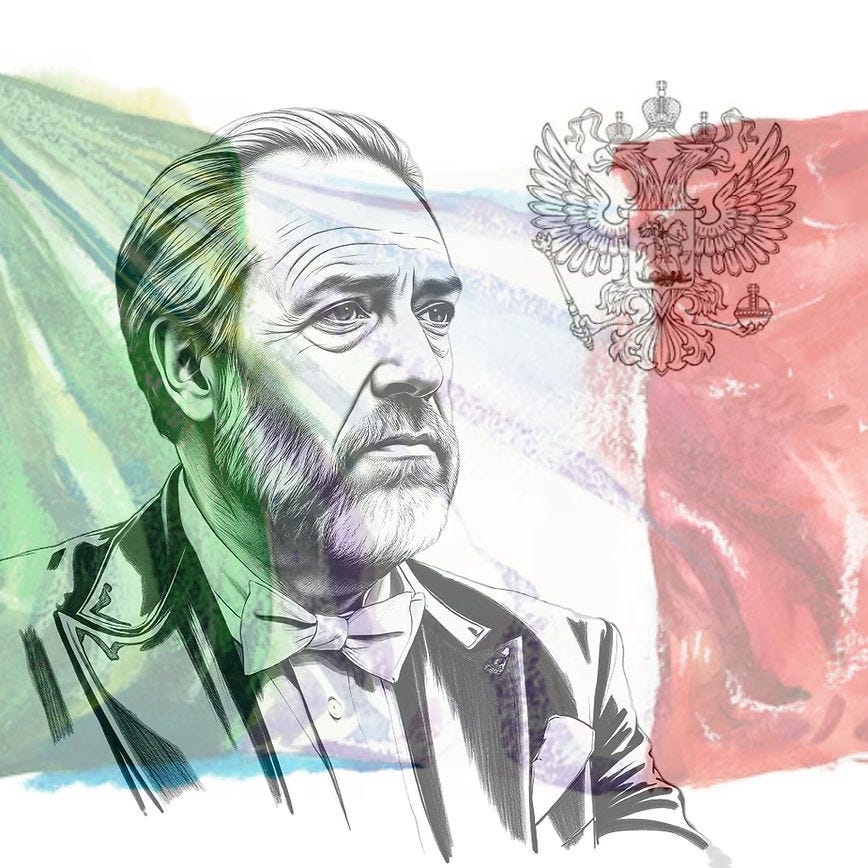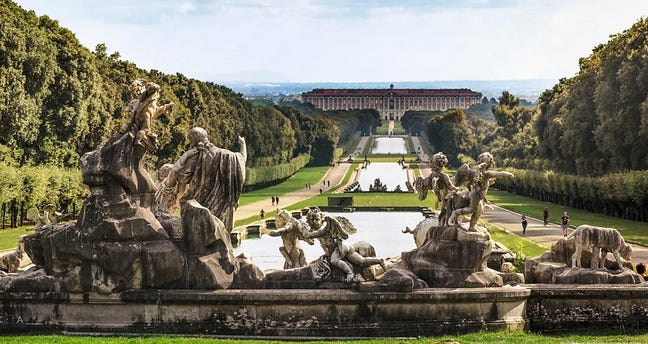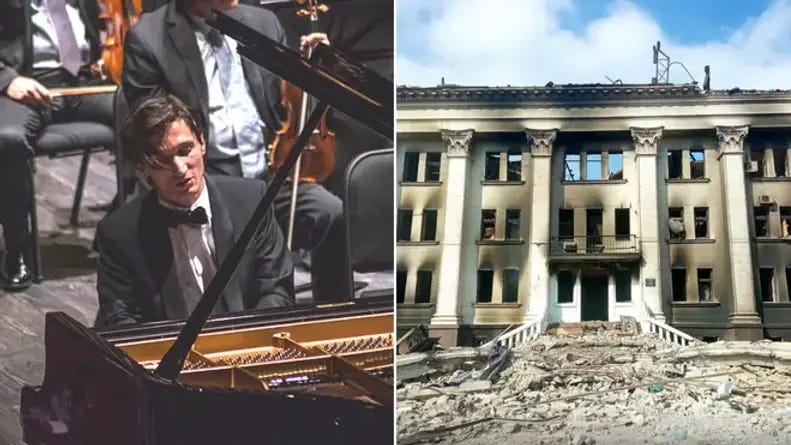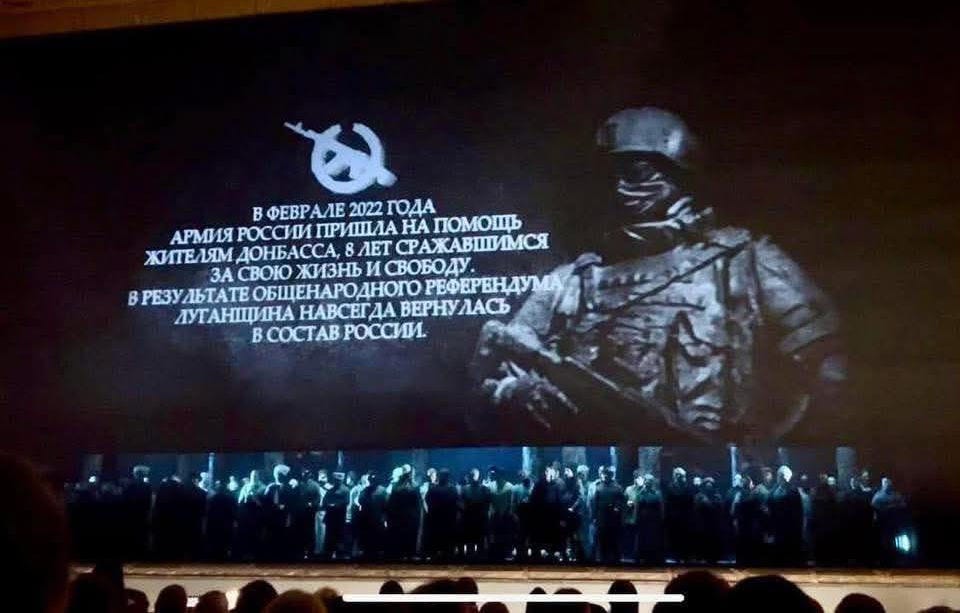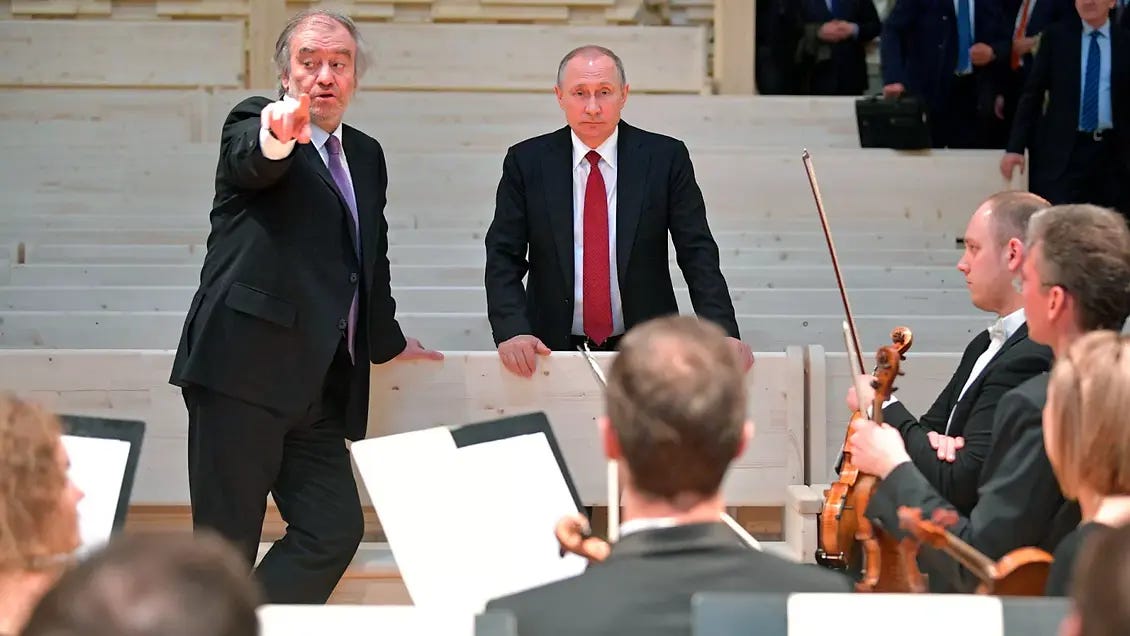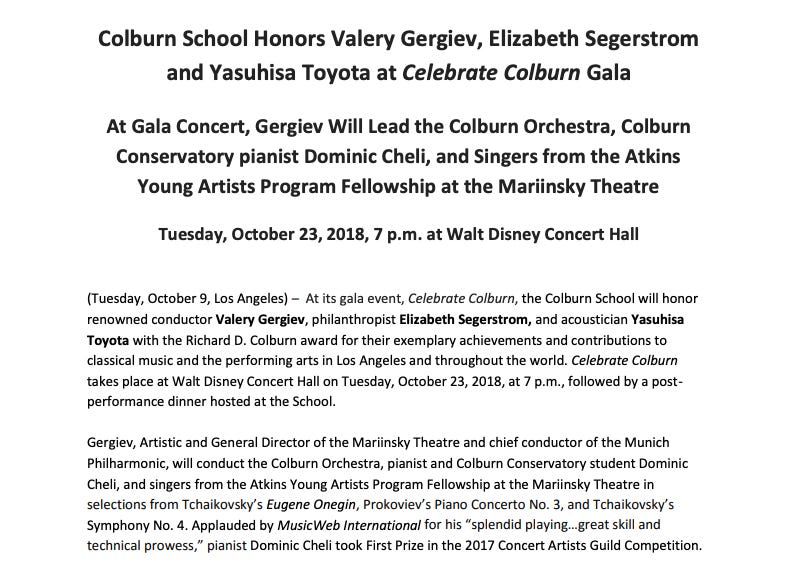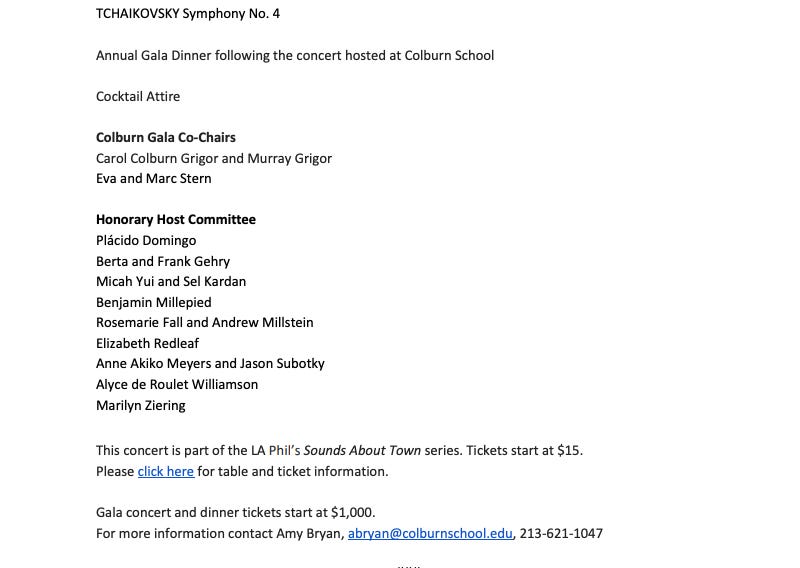Gergiev and Netrebko: Icons of a Weaponized Culture
- By Katie A. Berglof
(This article was originally published on 7/21/2025 on harpsichord-hotsauce.com….there are many photos not posted here that you can view on the original article. I will come back and reformat the copied version below at some point. Apologies if it isn’t visually as smooth as on the website.)
Italy Drew the Line. So Should We.
This week, a concert by Valery Gergiev at the Reggia di Caserta was canceled by the Italian Ministry of Culture. The decision followed a wave of public outrage, protests from activists, and a firm statement from Culture Minister Alessandro Giuli:
“Art is free and cannot be censored. Propaganda, however, even if done with talent, is something else.”
That sentence should be etched into every grant letter, gala program, and programming decision across the global arts world.
Gergiev’s planned appearance at the Un’Estate da Re festival wasn’t an isolated event—it was a test balloon. A calculated reentry into Western cultural life. And make no mistake: if it hadn’t been stopped, it would have been framed by Russian state media as a triumph. In fact, it already was. Propaganda outlets celebrated the booking as a symbolic “victory over NATO.” Gergiev’s baton would have become a tool for whitewashing war crimes under the guise of art.
How an Italian Grassroots Alliance Brought Gergiev Down
The push to cancel the Caserta concert started in Italy, when local members of the online NAFO movement uncovered that European Union funds were helping underwrite the Kremlin-aligned conductor, Gergiev. They brought this to the attention of Pina Picierno, Vice-President of the European Parliament, who quickly submitted formal inquiries about the use of EU money and the ethical implications of hosting a Russian propagandist at a UNESCO-protected heritage site like the royal palace of Caserta.
This discovery helped spark a broader civic mobilization. The liberal party Europa Radicale purchased front-row seats and prepared for an in-hall demonstration. Free Russians in Italy staged protests in Milan. The Anti-Corruption Foundation and Yulia Navalnaya issued public letters of condemnation. Only after this wave of Italian-led pressure did Ukrainian diplomats and diaspora communities join forces, organizing buses for a mass protest at the festival. With momentum building—and backed by more than 700 intellectuals and Nobel laureates who signed an open letter denouncing the performance as “a gift to the dictator”—the Campania regional government and eventually Italy’s Ministry of Culture did what they should have done long ago: pulled the plug.
Meanwhile, the independent investigative newspaper Linkiesta published a bombshell exposé on what it called il sistema Gergiev—a sprawling propaganda and influence network embedded in Italy. The investigation detailed how shell foundations, fictitious companies, and luxury real estate holdings across Venice, Milan, Rome, and the Amalfi Coast were allegedly being used to funnel money into pseudo-cultural events that launder Russian messaging. At the center of this web is a 40-room estate in Massa Lubrense, reportedly used for off-the-record meetings designed to bypass international sanctions and channel funds into pro-Kremlin cultural soft power.
That is why this cancellation matters. It was a rare moment when Italian civil society, journalists, and lawmakers—long courted by Russian cultural diplomacy—linked arms, followed the money, and said no.
The fight isn’t over, but every contract scrapped (Alexander Romanovsky canceled in Bologna, Gergiev’s further canceled Spanish performances) proves how fast the dominoes fall once the curtain starts to drop.
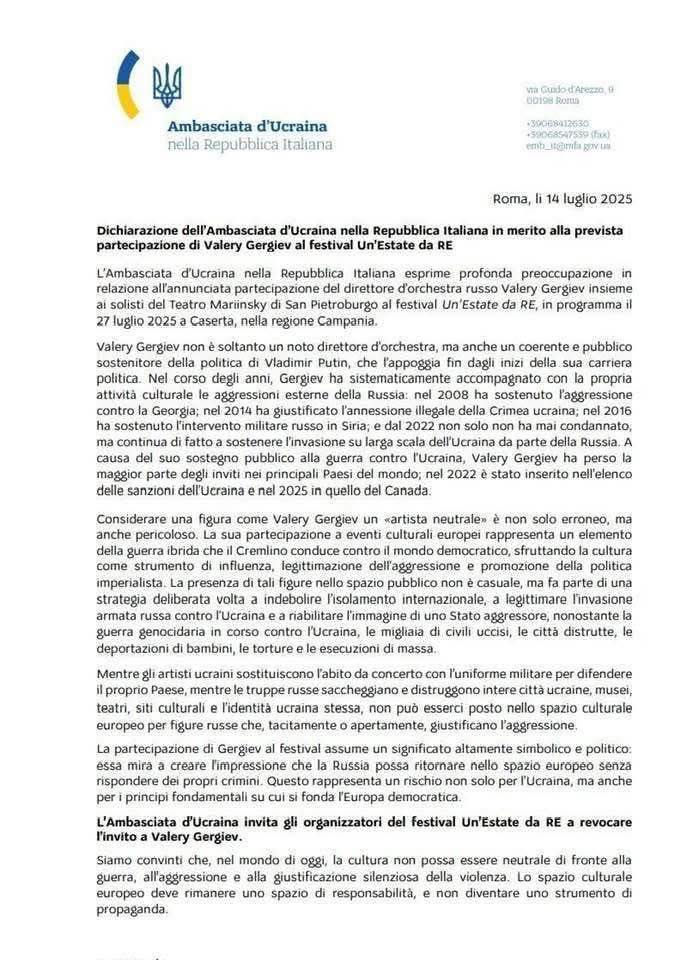
Ukraine Embassy Letter: “Valery Gergiev is not only a well-known conductor, but also a consistent and public supporter of Vladimir Putin’s policies. Over the years, Gergiev has systematically accompanied Russia’s aggression with his cultural activity: in 2008, he supported Russia’s aggression against Georgia, in 2014 he justified the illegal annexation of the Ukrainian Crimea, in 2016 he supported the military intervention in Syria, in 2022 he was included in Ukraine’s sanctions list and in 2025 in Canada’s list. To consider a figure like Valery Gergiev a “neutral artist” is not only erroneous, it’s also dangerous. His participation in European cultural events represents an element of the hybrid war that the Kremlin is waging against the democratic world. The presence of such figures in the public space is not accidental, but is a part of a deliberate strategy, aimed at weakening international isolation, legitimizing the Russian armed invasion of Ukraine and rehabilitating the image of an aggressor state.”
The Romanovsky Backlash: When Silence Drowns Out the Dead
As briefly mentioned, another Pro-Kremlin artist was canceled in Italy. Pianist Alexander Romanovsky was set to perform in Bologna next month on August 5th. But the city canceled his concert—not for what he played, but for where and why he played it. Romanovsky is a Ukrainian-born classical pianist who resides in Italy. He self-identifies as Russian while performing in Russia, and in the Russian-occupied Ukrainian territories—aligning himself with the very regime that bombs his birthplace. His most notorious appearance was in Mariupol, where he gave a concert in the ruins of the city’s drama theater—a building that once sheltered children and families before it was obliterated by a Russian airstrike in 2022, killing hundreds. That Romanovsky would use this site of mass civilian death as a backdrop for art was not an act of healing. It was propaganda, cloaked in a piano performance. As a result, the Royal College of Music in London suspended him from teaching.
The cancellation of his performances in Italy came after Bologna’s Liberal Democratic Party and civic groups called attention to Romanovsky’s participation in Kremlin-sanctioned cultural operations. But as applause broke out from activists, a different chorus emerged—one of indignation from Italian professors and critics declaring the cancellation as censorship.
But what do these voices know of loss?
They said nothing when Olena Kohut, an organist, was shot in the street in Sumy during a Russian missle strike. They never posted about Yuri Kerpatenko, the Ukrainian conductor executed by Russian forces in Kherson for refusing to conduct a propaganda concert. They offered no grief when opera singer Vasyl Slipak—a baritone from the Paris Opera who turned soldier—was killed by a sniper while defending his country. They did not mourn the dozens of Ukrainian musicians who have been displaced, silenced, tortured, or killed for nothing more than existing under occupation. These artists didn’t get to debate nuance from a conservatory office. They died while the world debated whether culture should “remain neutral.” And now, the real tragedy—according to Romanovsky’s defenders—is that he doesn’t get to perform. You can live in the birthplace of opera, be surrounded by Dante and Verdi, Michelangelo and Botticelli—and still not understand that culture without conscience is not civilization. It’s window dressing for cowardice. Because if your definition of “artistic freedom” includes performing atop the rubble of a massacre, you’re not defending art....you’re desecrating it.
The Illusion of Artistic Neutrality
As stated in our last article on Gergiev—for decades, Western institutions have clung to the idea that art exists above politics. It doesn’t. It never has. Especially not when wielded by regimes that understand its power. Gergiev has conducted victory concerts in Syria amidst the rubble left by Russian airstrikes. He performed in South Ossetia after the 2008 invasion of Georgia. Take this image for example, captured just three days ago at the Bolshoi Theater in Moscow during a performance of Prokofiev’s Semyon Kotko (conducted by Gergiev, who currently serves as the theater’s General Director). The picture is of a modern Russian soldier, with the text, "In February 2022, the Russian Army came to the aid of the people of Donbas. As a result, the Luhansk region has rejoined Russia forever."
For those who are not familiar with Prokofiev's opera Semyon Kotko, it reflects Soviet imperialism over Ukraine. Its storyline is fundamentally pro-Soviet. It portrays the Bolsheviks as the liberators of Ukraine....and Ukrainian nationalist or anti-Soviet figures (like Tkachenko) as villains or traitors. The opera ends with a celebration of Ukraine's absorption into the Soviet Union — something modern Ukrainians, especially in light of current events, see not as liberation, but as colonization and repression. By projecting this message during a performance of Semyon Kotko, the Bolshoi Theater and Gergiev are drawing a direct, propagandistic parallel between the Soviet annexation of Ukraine in the early 20th century (as glorified in the opera); and the 2022 full-scale Russian invasion and illegal annexation of parts of Ukraine, including Luhansk.
This is a clear and deliberate attempt to frame Russia’s modern war of aggression as a historic continuation of "liberating Ukraine," thereby justifying the invasion with cultural and historical myth making.
Gergiev is not an unwitting pawn. He is a knowing collaborator. A cultural ambassador for the Kremlin, trusted to deliver state messaging with a Tchaikovsky symphony in one hand and a war narrative in the other.
This is soft power. And for too long, Western institutions in particular have allowed it to pass unchecked—because ticket sales were good, because donors were impressed, or because confronting it felt inconvenient.
What About Netrebko?
And then there’s Anna Netrebko.
She wasn’t just photographed with a separatist flag in Donetsk with Oleg Tsarev, a leader of the armed separatists. She publicly supported pro-Russian forces in Ukraine, called the rebels her “brothers,” and gave a donation of 1 million rubles to a theater in Donetsk controlled by militants—all while refusing, for years, to denounce Vladimir Putin or his brutal war.
When the Metropolitan Opera dropped her in 2022 due to her refusal to publicly denounce Vladimir Putin and Russia's invasion of Ukraine, she sued—not because she was innocent of political ties, but because she claimed discrimination. She won a $200,000 payout due to a contractual loophole, not exoneration.
Met's General Manager, Peter Gelb went on to state, “I believe she had certain discussions with the Kremlin. And, as I see it, she came back to me and said: ‘I stand with my country.’ And that was when I fired her. Her statement a month later claiming she was against the war — in my opinion, was insincere. It appeared only because I terminated her. Legally, I consider it to be an insincere statement. I don’t believe she truly meant it.”
Now, in 2025, she’s reemerging. Earlier this year, Palm Beach Opera hosted her as the star guest of their gala at the Breakers Hotel. That glittering endorsement sent a message—especially to Ukrainian artists: that the suffering of their people can be set aside for the sake of social climbing, nostalgia, and luxury branding. But outside the velvet seats and donor receptions, the resistance is loud.
The growing backlash against Valery Gergiev and Anna Netrebko has been led by a broad and determined coalition of activists, artists, and political figures across Europe and beyond. At the forefront is Arts Against Aggression, an international group organizing sustained protests and campaigns targeting cultural figures who align themselves with authoritarian regimes. From street demonstrations to digital mobilization, their work has galvanized a wide range of allies, including LGBTQ+ activists who protested both artists as early as 2013 for their silence on Russia’s anti-LGBTQ+ laws, and Ukrainian advocacy groups who have taken to the streets in cities from New York to Naples.
Among the most vocal efforts in the United States is Signerbusters, an international group with a presence in New York that focuses on raising awareness about Russia’s war against Ukraine and exposing Russian cultural figures who actively support the invasion. Signerbusters works to educate the public and cultural institutions about Russia’s “hybrid soft power war”—where artistic influence is leveraged to normalize aggression and whitewash atrocities. The group has protested appearances by conductor Valery Gergiev, pianist Denis Matsuev, actors Aleksei Guskov and Evgeniy Knyazev, and theater administrator Kirill Krok, all of whom they identify as collaborators in the Kremlin’s cultural propaganda strategy.
(See photos on original article….)
Joining them are Russian dissidents, exiled artists, and global human rights voices—including Yulia Navalnaya, the widow of slain opposition leader Alexei Navalny, who has publicly condemned Gergiev’s appearances. High-level political figures such as Pina Picierno, Vice-President of the European Parliament, and Riccardo Magi, leader of Italy’s More Europe party, have echoed those calls for accountability. From hashtags like #CancelGergiev to formal petitions and real-world protests, these voices are making clear that cultural complicity will not be tolerated—and that artistic prestige is no longer an acceptable shield for those who serve power over truth.
A Long History of Looking Away
However, let’s not forget that American institutions often turn a blind eye to corruption. They have hosted Gergiev for decades, and if we have learned anything from history, it's that artists eventually get invited back. Here are a handful of American institutions that have hosted Gergiev in the past:
Carnegie Hall, where he was slated to conduct the Vienna Philharmonic just as bombs began falling on Ukraine in 2022. He was replaced last minute by Yannick Nézet-Séguin.
The Metropolitan Opera, where Gergiev served as Principal Guest Conductor from 1997 to 2002, and made regular returns after.
San Francisco Opera, where he debuted with War and Peace, an opera drenched in Russian militarism.
Chicago Symphony. Boston Symphony. Cleveland Orchestra. LA Philharmonic. National Symphony. New York Philharmonic. All brought him in as a guest—sometimes as recently as the late 2010s.
These American institutions have yet to publicly denounce Gergiev. Some canceled quietly. Others simply stopped mentioning him. But silence is not the same as accountability. Due to Gergiev's refusal to condemn Russia's invasion of Ukraine, many other institutions and festivals have severed ties. These include:
Munich Philharmonic: Gergiev was fired as chief conductor of the Munich Philharmonic in March 2022.
Rotterdam Philharmonic: The orchestra ended its relationship with Gergiev, canceling his concerts and the annual Gergiev Festival.
Edinburgh International Festival: Gergiev resigned as honorary president of the festival at the request of the board of trustees.
Verbier Festival: Gergiev resigned as music director of the Verbier Festival Orchestra at the request of the festival.
Lucerne Festival: Gergiev and the Mariinsky Orchestra's concerts were canceled in August 2022.
Carnegie Hall: Gergiev was replaced for performances with the Vienna Philharmonic and appearances with the Mariinsky Orchestra were canceled.
Metropolitan Opera: The Met announced it would not allow artists who support Vladimir Putin to perform there.
Milan's La Scala: The theater cut ties with Gergiev after he failed to respond to the mayor's appeal to speak out against the war.
Riga Jurmala Festival: The festival was canceled altogether.
Philharmonie de Paris: The concerts with the Mariinsky Theater Orchestra and Gergiev were canceled.
Festspielhaus Baden-Baden: This institution has also severed ties with Gergiev.
Complicity by Curation
Gergiev and Netrebko are not being “canceled” for their Russian identity. They are being criticized for actively and repeatedly promoting an authoritarian state’s violence, lies, and territorial aggression.
In the arts, platforming is power. A podium is not neutral ground—it is a place of influence, a place where narratives are validated, history is shaped, and moral legitimacy is either reinforced or revoked.
When we allow individuals like Gergiev or Netrebko to return to U.S. stages without consequence, we allow those stages to become platforms for propaganda.
This isn’t about banning artists. It’s about recognizing when artists themselves have become instruments of war.
What American Institutions Must Do
Publicly Commit to a Cultural Sanctions Policy. State clearly that artists who support regimes engaged in war crimes, repression, or disinformation campaigns will not be invited, regardless of their prestige.
Reevaluate Legacy Honors. Review awards, honorary degrees, and past tributes. Rescind them when necessary. Institutions must correct the record and remove complicity from their own archives. We’re looking at you, Colburn Conservatory of Music—which honored Gergiev on October 23, 2018, at the Walt Disney Concert Hall during its 20th anniversary gala.....
.....Yes, we remember. And more importantly, so do your alumni. Students at the time warned against it. They wrote letters. They spoke out. And they were ignored. That silence aged poorly. It's time to take responsibility and revisit not just the decision, but the institution’s unwillingness to listen when students raised legitimate ethical concerns.
Cut Through the Euphemisms. Stop hiding behind phrases like “art transcends politics” or “we don’t engage in censorship.” When the person on stage is echoing state propaganda, that is not transcendence—it’s a transmission.
Platform Artists Who Speak Truth. There are countless Russian, Ukrainian, Belarusian, Georgian, and dissident voices who oppose Putin’s war machine. Elevate them. Fund them. Give them the platforms Gergiev and Netrebko once held.
Protect Whistleblowers and Critics. Many musicians in the U.S. have spoken out against Gergiev’s associations, only to be silenced or ignored. They deserve protection, not punishment, for telling the truth.
This Is a Defining Moment for U.S. Music Institutions
Italy’s cancellation of Gergiev is not just an isolated act of protest. It is a precedent.
Canada’s sanctions, Germany’s removals, and even Spain’s quiet withdrawal of Gergiev’s concerts are part of a larger reckoning with how authoritarian power operates through cultural channels.
And now, the United States must decide: will we remain silent and risk becoming a safe harbor for whitewashed influence, or will we finally draw our own red line?
To arts leaders across America: This is not about politics. This is about conscience. This is not about Russian music. It is about weaponized celebrity. And this is not about cancel culture. It is about justice.
We owe the truth to the Ukrainian people. We owe accountability to our own audiences. And we owe it to the future of the arts to ensure that our stages are not extensions of authoritarian warfare.
There is still time to act. The world is watching, and what we do next will define us and echo through every silence that follows.
(c) Katie A. Berglof, 2025


